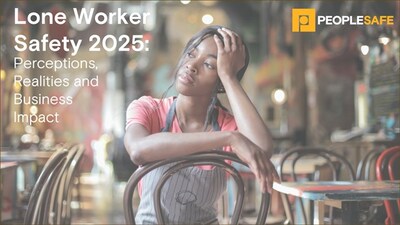Unsupported, unheard and unsafe - report reveals stark safety picture among lone workers
EPSOM, Surrey, Sept. 12, 2025 /PRNewswire/ -- A report into the safety habits and attitudes of lone workers has revealed issues around mental health, productivity and a lack of confidence when it comes to reporting incidents.
The study, Lone Worker Safety: Perceptions, Realities and Business Impact, conducted by leading lone worker technology provider Peoplesafe, found that feeling unsafe was more likely than experiencing a safety incident. Significantly, these safety concerns impacted on the productivity of 18% of workers (1 in 5). Extrapolating this one in five to a larger workforce suggests a substantial loss in output.

Blind spot
The survey canvassed lone workers across multiple sectors including retail, healthcare and transport and revealed that 43% reported feeling unsafe at some point in their work environment.
Responses to workforce safety concerns were found to be lacking, with 68% of workers revealing that their employers did nothing when they raised issues around their personal safety. It suggests a safety blind spot between employers and workforce.
In some cases, this lack of action was so ingrained that many no longer flagged incidents. "It's part of my job," said one respondent, accepting the role will continue to make them feel unsafe. "You just get on with it," said another.
Root causes
When asked what made them feel unsafe while lone working, having to work early or late and dealing with members of the public were the two main concerns cited.
"A customer threatened to wait for me and kill me after my shift," shared one respondent, revealing the level of abuse public-facing workers can face.
Having little support in these environments only amplified these unsafe feelings even if it's only for a short time. "I often work on my own in our office until 5pm. Other people finish at 4:30 and I often worry about something happening to me and no one around to help."
Employees who start work early, overlap with shift patterns, or stay late to complete a task are effectively lone working during these pinch points and become exposed to lone worker risks causing safety concerns.
The report found that feeling unsafe had a detrimental impact on workers' wellbeing - with 47% reporting that these workplace experiences had harmed their mental health.
"I'm often lone working and have anxiety about visiting certain areas or properties," one respondent shared. "It badly affected my mental health and made me anxious and depressed, so I had to take time off work," another said.
Commenting on the research, lone worker expert and former Group Risk Head of Safety at Co-Op, Sue-Parker Tantush, suggests employers reframe their approach to wellbeing. "As lone working increases alongside workforce reductions, it's disappointing to see person-centred risk assessments still so often overlooked as we continue to be focused on-task.
Seeing risk through the eyes of your employees not only shows you care, it ensures you're choosing the right solutions to truly support them."
Technology
The report also gauges technology use and the role it plays in safety management strategies. Lone worker technology has advanced rapidly in the last five years with the development of app-based solutions, wider network coverage from eSIMs and wearable smart watch integrations. According to the Berg Insight report, the lone worker market value in Europe is expected to grow to €178 million in 2029 representing a CAGR of 4.5%.
For employers, it's important to recognise that the right technology, combined with a strong culture of safety, can restore employee confidence, lower risk and improve business performance.
www.peoplesafe.co.uk/
To download the report visit: https://insights.peoplesafe.co.uk/story/lone-worker-report-2025/
For further information please email: marketing@peoplesafe.co.uk
Editor's notes
About Peoplesafe
Peoplesafe is the largest provider of employee safety technology in the world. Our service protects your most valuable assets: your people - wherever they are and whenever they need it by integrating state-of-the-art technology with a dedicated, 24/7 Alarm Receiving Centre (ARC).
Getting emergency help faster than 999 is our mission. We deliver on this by answering SOS alarms in 3 seconds through our fully accredited ARC which has a direct line to police forces across the UK. This industry-leading service is why we are trusted to protect over 350,000 users and work with some of the UK's largest organisations, such as the NHS, Openreach and Tesco.
Photo - https://mma.prnewswire.com/media/2768748/Lone_Worker_Safety_2025_Report.jpg
Logo - https://mma.prnewswire.com/media/2768747/PeopleSafe_Logo.jpg

![]() View original content to download multimedia:https://www.prnewswire.co.uk/news-releases/new-research-from-peoplesafe-suggests-concerns-are-being-ignored-while-mental-health-suffers-and-productivity-wanes-302551303.html
View original content to download multimedia:https://www.prnewswire.co.uk/news-releases/new-research-from-peoplesafe-suggests-concerns-are-being-ignored-while-mental-health-suffers-and-productivity-wanes-302551303.html

